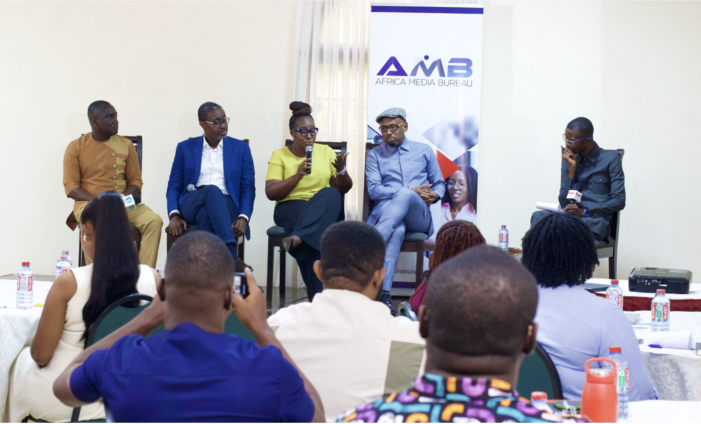Ace Kojo Anan Ankomah, a private legal practitioner, has cautioned media practitioners and the public about the dangers of rushing to post unverified information on social media, especially during election periods.
Addressing the legal risk associated with online communication, Mr Ankomah underscored the critical importance of verifying content before sharing it online as that had potential legal ramifications.
He was speaking at a Media Executive Breakfast organized by the Africa Media Bureau (AMB) on the theme: “Ethical Consideration and Risks in Programming for Social Media: Responsible Election Reporting”.
“On the internet, if it is too good to be true, it is too good to be true,” Mr. Ankomah emphasized, urging media houses to exercise restraint and diligence in their reporting.
He explained that with the rapid spread of information facilitated by social media, unverified posts could have far-reaching consequences, including defamation and costly legal battles.
Citing a personal experience to illustrate the potential harm of misleading headlines or posts even when the underlying content is innocuous, Mr Ankomah recounted how a seemingly harmless video of him playing a piano at an airport went viral, misinterpreted by captions that were unrelated to the video’s content.
Today, he said, damage from libel was presumed because of the reach of social media and that millions could access false or misleading content within seconds as the courts were beginning to award heavier damages for such cases.
Mr. Ankomah who referenced key cases in Ghana’s legal history where the court awarded significant damages for copyright infringement and cyber libel, urged social media users to be mindful of the potential harm of their posts.
He called on media houses to adopt robust social media policies to regulate the use of their platforms and ensure compliance with the law.
“Monitor your content closely…If it looks inappropriate, delete it. Explicit consent is required to use copyrighted material, and when in doubt, don’t use it,” he advised.
Mr Ankomah, also a Senior Partner of Bentsi-Enchill, Letsa & Ankomah, speaking about the legal implications of child protection laws, data privacy, and unauthorised electronic communications, warned that actions such as publishing indecent images of minors or using personal data without consent could result in criminal prosecution.
He urged all stakeholders, including political parties, to refrain from posting unverified content in their quest for public engagement as Ghana prepared for the crucial December 7 polls.
“Take a moment to think. Wait for 24 hours. Verify the facts before putting it out there,” he advised.
Dr Aurelia Ayisi, Lecturer, University of Ghana, expressed concern over the challenges posed by digital technology to the integrity of journalism and the credibility of information, calling for the need for a collective, multi-stakeholder approach to combat misinformation and rebuild trust in the media.
She pointed to the re-democratization of media brought about by digital spaces, stressing that while this development had allowed for greater participation in information dissemination, it had also blurred the lines between professional journalists and citizen content creators.
“While it’s all well and good to think that people can distinguish truth from fabrication, that is not always the case. The integrity of truth itself is under question,” she said.
She emphasized that misinformation, disinformation, and malinformation had created an environment where even accurate information could be manipulated to mislead.
“We are living in a post-truth era,” she explained, and “although the truth exists, it is buried under an avalanche of misinformation and distorted narratives. Malinformation —where true information is presented in a false context — poses one of the most significant threats to journalistic integrity today.”
Dr Ayisi highlighted the critical role of information, digital, and media literacy in addressing these challenges, stating that despite widespread access to mobile devices and social media platforms, many users lacked the literacy skills to evaluate the credibility of the information they encountered.
Dr. Ayisi acknowledged that journalists were working in an increasingly difficult environment, where the demand for speed often conflicted with the need for accuracy, emphasizing that “getting it right has become even more paramount”.
While she acknowledged that finding comprehensive solutions may be idealistic, Dr. Ayisi called for progressive efforts to address the crisis of misinformation.
The Africa Media Bureau (AMB), a pioneering media organization dedicated to elevating the media landscape across the African continent, believes that a dynamic and robust media industry is essential for Africa’s progress and global engagement.
Latest Stories
-
Ghana Armed Forces set to employ thousands soon – Defence Minister announces
21 minutes -
‘He’s more than a mentor, he’s my big brother’- Stonebwoy surprises Samini with emotional tribute on live TV
1 hour -
Markets react to budgets, not spending – Sharif Mahmud Khalid on Fitch Upgrade
2 hours -
Sinking fund reactivation is our insurance – Economic Advisor Sharif Mahmud Khalid on Fitch upgrade
2 hours -
Thin, light and built to last: New era of Galaxy Z Series Samsung takes Galaxy Z Series to a new era
3 hours -
Ghana, Ivory Coast cocoa supply shortage makes chocolate prices soar in UK
3 hours -
Experts question whether $499 gold Trump phone can be US-made
4 hours -
Fidelity Bank launches GTIC 2025 to empower idea-stage GreenTech Innovators
4 hours -
Ghana requires $6bn to implement comprehensive flood control measures – Minister
4 hours -
DDEP, not reforms, behind ratings boost – Economic Advisor Sharif Mahmud Khalid admits
4 hours -
Fitch upgrade: We’re not rushing to re-enter external markets – Sharif Mahmud Khalid
5 hours -
‘No-bra, no-exam’ rule at Nigerian university sparks outrage
5 hours -
Spain’s government blames huge blackout on grid regulator and private firms
6 hours -
World’s only twice-a-year shot to prevent HIV could stop transmission – if people can get it
6 hours -
Mobile banker jailed 5 years for stealing GH¢70,840
6 hours

